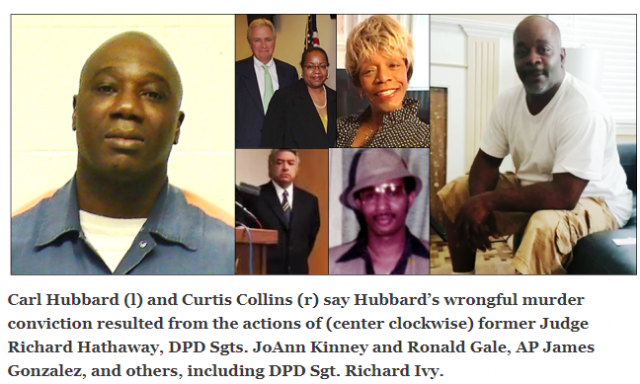
(Carl Hubbard talks about his wrongful conviction: start at 40 minute mark.)
Detroit Metro Times reported Sept. 27, “Illegal document purge in Wayne County Prosecutor’s Office blocks freedom for the wrongfully convicted.”
MT wrongly blames document purge for false convictions, absolving WCPO, Detroit Police and Judges of blame for deliberate frame-ups of thousands in the MDOC, and refusal to grant their appeals at all levels
VOD first reported the document purge June 15, 2011 in its article, “DPD, MSP, and Worthy Guilty in Crime Lab Cases, Says People’s Task Force.”
Carl Hubbard was framed-up by DPD Sgt. JoAnn Kinney; prosecution’s sole witness recanted previous ID to testify truthfully, was arrested for perjury in front of Judge Richard Hathaway; both went on to work for Kym Worthy
Hubbard fought case all the way to 6th Circuit, where Senior Judge R. Guy Cole called him “actually innocent” in profound 44-page dissent
KYM WORTHY CAN VACATE FALSE CHARGES V. CARL HUBBARD NOW!

Cook Co. Pros. Foxx
Cooks County prosecutor Kim Foxx dropped charges against Alexander Villa Oct. 2, after dropping them last year against two co-defendants, in the killing of Chicago police Officer Clifton Lewis. The prosecution concealed evidence that none of the three were at the scene of the crime. If Wayne Co. Prosecutor Kym Worthy has a conscience, she can and must do the same for Carl Hubbard now! He was not at the scene of the crime! He is actually innocent, according to 6th Circuit Court Senior Judge R. Guy Cole.
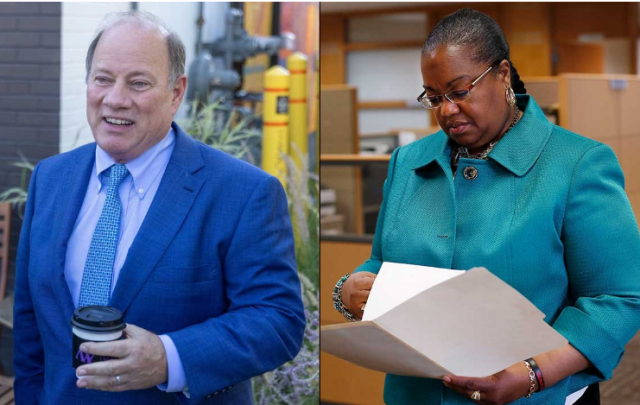
Composite photo of Detroit Mayor Mike Duggan, Wayne Co. Prosecutor Kym Worthy from Metro Times article.

EDITORIAL
By Diane Bukowski
September 30, 2024
DETROIT — The Detroit Metro Times reported Sept. 27, “Illegal document purge in Wayne County Prosecutor’s Office blocks freedom for the wrongfully convicted.”
“Wayne County illegally destroyed troves of criminal files allegedly when Mayor Mike Duggan was the elected prosecutor, creating a staggering obstacle for wrongfully convicted inmates seeking to prove their innocence, iMetro Times has learned,” says MT investigative reporter Steve Neavling in the article.
“Between 2001 and 2004, while Duggan was prosecutor, most if not all misdemeanor and felony records from 1995 and earlier were allegedly removed from an off-site warehouse and destroyed in violation of state law.” https://www.metrotimes.com/news/illegal-document-purge-under-duggan-in-wayne-county-prosecutors-office-blocks-freedom-for-wrongfully-convicted-37435318
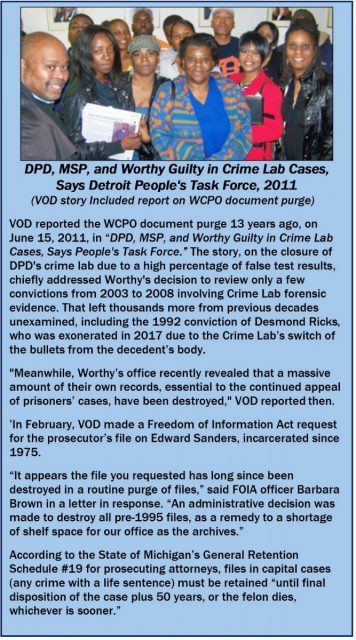 Neavling adds, “The file purge was not previously reported. Metro Times learned about it recently in interviews for an ongoing series about wrongful convictions.”
Neavling adds, “The file purge was not previously reported. Metro Times learned about it recently in interviews for an ongoing series about wrongful convictions.”
This article does a profound disservice to prisoners victimized by wrongful convictions, and to their families and supporters. It gives them false hope that finding an undisclosed document will miraculously set them free.
The MT article fails to distinguish between “prosecutor files” kept by the WCPO, court files which are kept separately by the County Clerk as the main repository for the county’s criminal court records (under state laws), and DPD files kept by the Police in varying formats, including homicide files.
VOD reported on the pre-1995 document purge 13 years ago, in 2011. A statement from the WCPO clearly says then that the purge involved the prosecutor files. (See box above), full VOD story linked below.)
VOD story at https://voiceofdetroit.net/2011/06/15/dpd-msp-and-worthy-guilty-in-crime-lab-cases-says-peoples-task-force/
In fact, the City of Detroit Law Dept., which handles FOIA’s for DPD records, is releasing over 360 pages of from the homicide file of Carl Hubbard to VOD shortly. Hubbard is a subject of the MT article. VOD has been covering his case for the last three years.
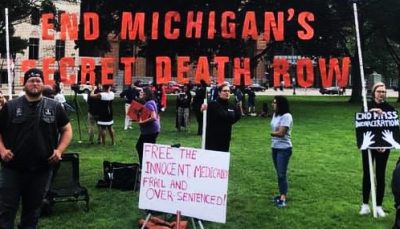
Rally at Michigan Capitol in Lansing 2021
While reporting the bare facts of Hubbard’s conviction correctly, the MT story implies the document purge is the sole problem causing his continued wrongful detention as well as thousands more. It absolves Wayne County Prosecutor Kym Worthy, the Detroit Police Department, judges, and the rest of the criminal injustice system of responsibility for committing thousands of human beings to death in prison, knowing their convictions were based on lies, threats, and other criminal actions.
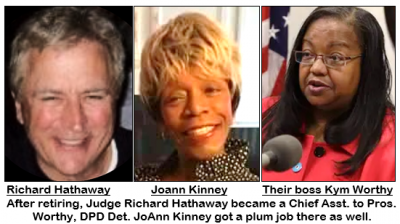 Two of the chief players in Hubbard’s frame-up went to work for Wayne County Prosecutor Kym Worthy after they retired. and were there as Hubbard repeatedly appealed his conviction. They know what they did, and so do others in the prosecutor’s office, missing “prosecutor files” or not. They are DPD Sgt. JoAnn Kinney and Judge Richard Hathaway.
Two of the chief players in Hubbard’s frame-up went to work for Wayne County Prosecutor Kym Worthy after they retired. and were there as Hubbard repeatedly appealed his conviction. They know what they did, and so do others in the prosecutor’s office, missing “prosecutor files” or not. They are DPD Sgt. JoAnn Kinney and Judge Richard Hathaway.
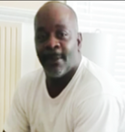
Curtis Collins
On the first day of Hubbard’s trial, Curtis Collins, the prosecution’s sole “eyewitness,” recanted his preliminary exam testimony that he saw Hubbard near the crime scene, and told the truth. He said that Sgt. JoAnn Kinney, and officers Richard Ivy, Ronald Gale, and others threatened to have his parole revoked because they found drugs on him, and to charge him with perjury and the murder itself, if he did not implicate Hubbard.
He was promptly arrested after he left the stand, with the complicity of Hubbard’s trial Judge Richard Hathaway, and charged with perjury. Kinney and other officers held him at the DPD lock-up for two days until he returned to the stand and changed his testimony back. Kinney is among many DPD officers from previous decades who have been responsible for wrongful convictions.
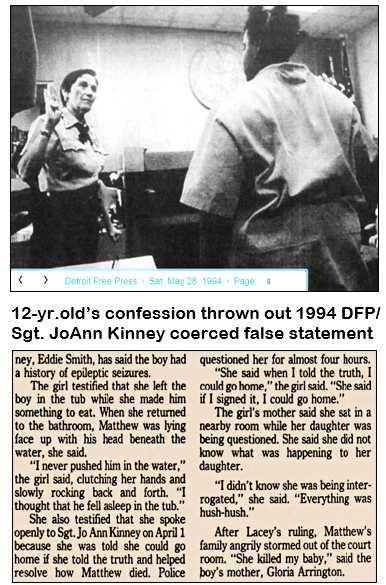 Kinney and other DPD officers locked up Thoanchelle Taylor, a mother of two, as a witness to a 1992 murder. They held her until her 12-year-old daughter and 6-year-old son implicated her in the murder. At trial, Judge Kathleen Judge Kathleen McDonald said there was not a “scintilla of evidence” against Taylor.
Kinney and other DPD officers locked up Thoanchelle Taylor, a mother of two, as a witness to a 1992 murder. They held her until her 12-year-old daughter and 6-year-old son implicated her in the murder. At trial, Judge Kathleen Judge Kathleen McDonald said there was not a “scintilla of evidence” against Taylor.
She added, “If I have ever seen a case where the police have manufactured the facts, this is one. I have never had facts as egregious as this case.”
The Detroit News reported, “Kinney testified that she had Taylor locked up as a witness for days without charges against her and said there was no standard procedure as to how long witnesses could be held without being arrested. Kinney also admitted threatening to take Taylor’s children away if she did not cooperate. . .”
Kinney was also involved in eliciting a confession from a 12-year-old girl to a charge of murder of a child she was babysitting, by promising she could go home if she confessed The confession was thrown out by a juvenile court judge in 1994. Kinney had interrogated her for four hours without the presence of her mother.
Hubbard nearly died from COVID-19 as he fought his conviction pro se from the depths of the prison system, blocked at every step by the prosecution’s refusal to concede the truth.
THE ‘ACTUAL INNOCENCE” OF CARL HUBBARD

Lorinda Swain, exonerated
“If it is not contrary to the law for an actually innocent person to be locked up for a crime she never committed, what value is the law? The word-play of lawyers is mere pettifogging when aimed at keeping innocent people in prison. It is important to maintain perspective in deciding legal issues that strike to the core of justice. As Michigan knows well, even governors may become prisoners, and prisoners governors, and any of the citizens in whose name a sentence is carried out today may be wrongfully accused of a crime tomorrow. J. Rawls, A THEORY OF JUSTICE, 136-42 (1971)”
Intro to Amicus Curiae Brief Of Current And Former Michigan Prosecutors, Michigan v. Lorinda Irene Swain, Mich. Supreme Court No. 15099, 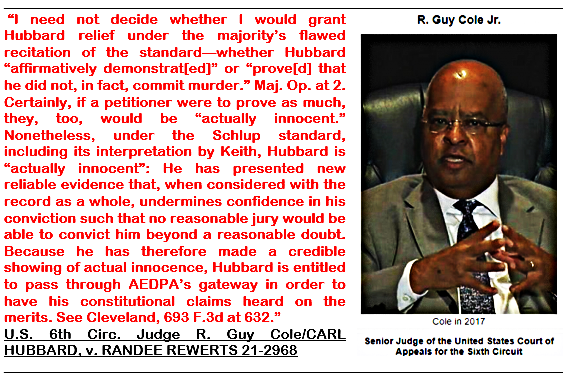
(Complete ruling with excerpt cited above, at http://voiceofdetroit.net/wp-content/uploads/Carl-Hubbard-6th-Circuiit-Opinion-4-16-24-24a0088p-06-highlighted.pdf. Refer to Dissent beginning P. 21.)
Hubbard twice won pro bono representation on his federal habeas appeal, from two prominent law firms based in Washington, D.C. Alexander Kazam of King & Spalding, LLC was appointed to represent him by the Sixth Circuit.
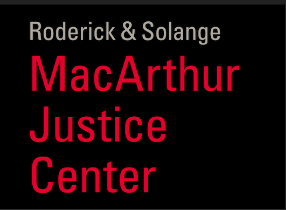 A three-judge panel, including one appointed by then President Donald Trump, issued a 2-1 split ruling to deny Hubbard relief at the first level.
A three-judge panel, including one appointed by then President Donald Trump, issued a 2-1 split ruling to deny Hubbard relief at the first level.
Gregory Cui of the MacArthur Justice Center appealed to the Sixth Circuit’s full en banc panel. On August 24, however, Hubbard was notified that the petition to the en banc panel was denied, without giving a reason. He is now working on a final pro se appeal to the U.S. Supreme Court.
Cui told VOD that their appeal was based on Sixth Circuit Senior Judge R. Guy Cole’s profound dissent declaring Hubbard “actually innocent” even without an evidentiary hearing. Below is Sixth Circuit Court Senior Judge R. Guy Cole’s summation of the subsequent history related to Collins (quoting from US District Court Judge David Lawson’s opinion at the District Court level..)
“Tired of Running from the Fact That He Had Put an Innocent man, Carl Hubbard, in prison.”
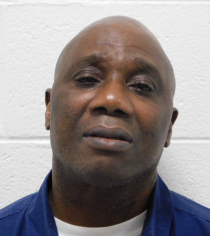
Carl Hubbard in 2024 OTIS photo
10/31/2017 affidavit of Curtis Collins: Curtis Collins signed an affidavit averring that he was not present anywhere near the Special K Party Store on January 17, 1992. Collins avers that he did not see the petitioner fleeing from where the victim was found shot to death. Collins claims that Sergeant Kinney forced him to testify falsely at the petitioner’s preliminary examination that he saw the petitioner fleeing the murder scene. Collins states he testified truthfully on the first day of trial. He says that he spent two days at the 1300 Precinct [Detroit Police Department Headquarters] where he was threatened by Sergeant Kinney and Sergeant Gale that he would be charged with the victim’s murder if he didn’t implicate the petitioner. Collins also states that as a result of this coercion, he returned on the third day of the petitioner’s trial and falsely implicated him in the victim’s murder.
. . .Collins went to prison in 2014 and 2015 and during the nine months there, realized how difficult prison was. Upon his release from prison, Collins learned that the assistant prosecutor in the petitioner’s case [James Gonzalez] was no longer working and the police on his case were now retired [JoAnn Kinney].Collins said he no longer had to worry about threats from these individuals to prosecute him and was “tired from running from the fact that he had put an innocent man, Carl Hubbard, in prison.”
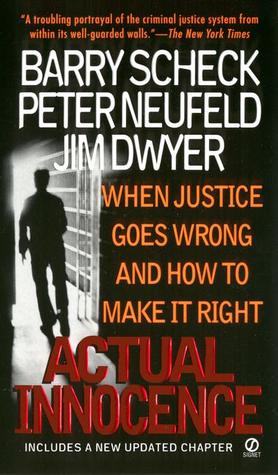 2/21/2018 polygraph examination of Curtis Collins: Petitioner attached as an exhibit to his second amended petition the results of a polygraph examination performed by Michael Anthony on Curtis Collins on February 21, 2018. Anthony asked the following questions of Collins: 1. Did you see Carl Hubbard shoot that man? Answer: No 2. Did you see Carl Hubbard shoot anyone at Gray and Mack in January of 1992? Answer: No 3. Were you present when Carl Hubbard shot that man? Answer: No. Anthony opined that Collins was being truthful regarding his answers to these questions.
2/21/2018 polygraph examination of Curtis Collins: Petitioner attached as an exhibit to his second amended petition the results of a polygraph examination performed by Michael Anthony on Curtis Collins on February 21, 2018. Anthony asked the following questions of Collins: 1. Did you see Carl Hubbard shoot that man? Answer: No 2. Did you see Carl Hubbard shoot anyone at Gray and Mack in January of 1992? Answer: No 3. Were you present when Carl Hubbard shot that man? Answer: No. Anthony opined that Collins was being truthful regarding his answers to these questions.
Judge Cole listed numerous other witness affidavits gathered by Hubbard since his conviction, and afterwards explained why each met the standards of case law as valid. They include: 1/2/2008 affidavit of Elton Carter: Collins told him that his September 2, 1992 trial testimony was coerced and that the police threatened to charge him if he did not agree to so testify. Carter avers that Collins told him that he wasn’t at the crime scene.6/25/2009 affidavit of Emanuel Randall: Collins was not near the crime scene on January 17, 1992. . . .Collins was with him and Raymond Williams playing a dice game when the men received a call that someone had been killed. 2/1/2011 affidavit of Askia Hill: Hill avers that he saw Mark Goings shoot the victim on January 17, 1992, but that he never told anyone because he feared for his life. Hill did not know the petitioner but had seen him in the neighborhood. Hill indicates that the petitioner was not the shooter.

Old DPD HQ 1300 Beaubien
5/23/2011 affidavit of Raymond Williams: Williams swears that while being detained at the Detroit Police Homicide Section between August 31 and September 2, 1992, he overheard Collins crying in his nearby cell. When Williams asked Collins what was wrong, Collins indicated that two police officers made him testify falsely against the petitioner at his trial on September 2, 1992. 9/8/2011 affidavit of Roy Burford: Burford avers that he was at the Special K party store on January 17, 1992, where the shooting took place, from 6:00 p.m. until closing and that at one point the store owner called police. Burford states he saw neither Curtis Collins nor the petitioner that night in the store or near it; 7/28/2014 affidavits of Raad and Samir Konja: [Samir] Konja [and brother Raad] indicates that [they were} co-owners of the Special K Party Store on January 17, 2014. Konja states that neither he nor his brothers permitted Collins in the store because of problems they had with him. Konja indicates that he was never spoken to by the police or the prosecutor.
“As I find Hubbard to be “actually innocent” based on the record before us today, an evidentiary hearing is unnecessary,” Judge Cole says. “But I understand that the additional reliable evidence may bring new questions to light. Should one require answers to these questions before resolving his actual innocence inquiry, there is a remedy for that—a remedy Hubbard has repeatedly requested: an evidentiary hearing.”
RELATED:
*********************************************************************************


 Voice of Detroit is a pro bono newspaper, now devoting itself entirely to stories related to our PRISON NATION and POLICE STATE. Funds needed NOW to pay quarterly web hosting fee of $460.00. VOD will disappear from the web if fee not paid.
Voice of Detroit is a pro bono newspaper, now devoting itself entirely to stories related to our PRISON NATION and POLICE STATE. Funds needed NOW to pay quarterly web hosting fee of $460.00. VOD will disappear from the web if fee not paid.
VOD’s editors and reporters, most of whom live on fixed incomes or are incarcerated, are not paid for their work. Ongoing costs include quarterly web charges of $460.00, P.O. box fee of $180/yr. and other costs including utility and internet bills, costs for research including court records and internet fees, office supplies, gas, etc.
Please DONATE TO VOD at:
https://www.gofundme.com/donate-to-vod
************************************************************************************




